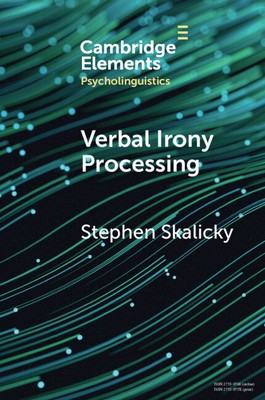
- We will send in 10–14 business days.
- Author: Stephen Skalicky
- Publisher: Cambridge University Press
- ISBN-10: 1009234544
- ISBN-13: 9781009234542
- Format: 15.2 x 22.9 x 0.4 cm, minkšti viršeliai
- Language: English
- SAVE -10% with code: EXTRA
Reviews
Description
Ironic language is a salient reminder that speakers of all languages do not always mean what they say. While ironic language has captured the attention of theorists and scholars for centuries, it is only since the 1980s that psycholinguistic methods have been employed to investigate how readers and hearers detect, process, and comprehend ironic language. This Element reviews the foundational definitions, theories, and psycholinguistic models of ironic language, covering key questions such as the distinction between literal and ironic meaning, the role of contextual information during irony processing, and the cognitive mechanisms involved. These key questions continue to motivate new studies and methodological innovations, providing ample opportunity for future researchers who wish to continue exploring how ironic language is processed and understood.
EXTRA 10 % discount with code: EXTRA
The promotion ends in 22d.14:49:10
The discount code is valid when purchasing from 10 €. Discounts do not stack.
- Author: Stephen Skalicky
- Publisher: Cambridge University Press
- ISBN-10: 1009234544
- ISBN-13: 9781009234542
- Format: 15.2 x 22.9 x 0.4 cm, minkšti viršeliai
- Language: English English
Ironic language is a salient reminder that speakers of all languages do not always mean what they say. While ironic language has captured the attention of theorists and scholars for centuries, it is only since the 1980s that psycholinguistic methods have been employed to investigate how readers and hearers detect, process, and comprehend ironic language. This Element reviews the foundational definitions, theories, and psycholinguistic models of ironic language, covering key questions such as the distinction between literal and ironic meaning, the role of contextual information during irony processing, and the cognitive mechanisms involved. These key questions continue to motivate new studies and methodological innovations, providing ample opportunity for future researchers who wish to continue exploring how ironic language is processed and understood.


Reviews